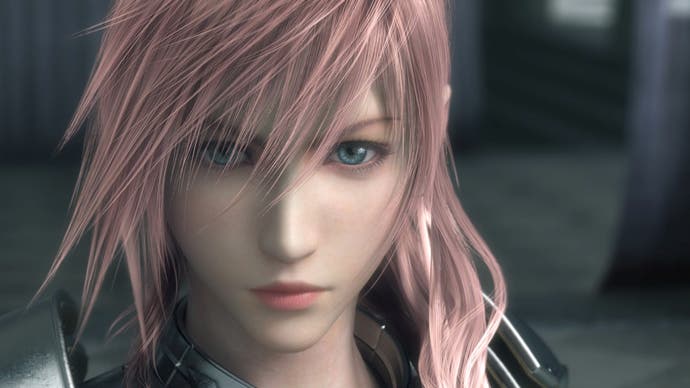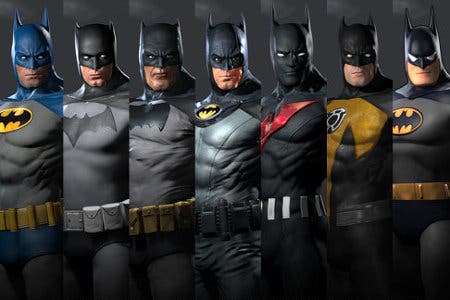The truth behind retailer-exclusive pre-order extras
Why stores do it and what it means for gamers.
One of the less popular trends of 2011 was the ramping up of the retailer-exclusive in-game extra. You know the sort of the thing - pre-order a title from Game and get a couple of extra character skins, choose HMV and get some weapon unlocks, or give your money to Zavvi and get early access to a map.
Depending on where you stand, it's either a nice bit of added value or a nuisance that prevents fans experiencing absolutely everything a game has to offer. Until recently it's been fairly easy to ignore. But things took a left turn with the release of Batman: Arkham City earlier this year, when UK supermarket giant Tesco secured a significant slab of DLC content all for themselves - a separate set of missions called Joker's Carnival Challenge Map. A sign of things to come, perhaps?
With that in mind we approached a number of UK retailers, publishers and developers to find out more about the process, why it happens and whether gamers are doomed to suffer as a result.
First things first, it's worth noting that almost every retailer we approached declined to comment. Read into that what you will. However, Tesco's games buying manager, Jonathan Hayes, did offer the supermarket giant's perspective, insisting that it's just a way to offer customers a little more for their money and incentive to commit to a pre-order.
"Retailer-exclusive content is all about adding great value to the customer," he said. "If you can work with suppliers then you can give the customer something that is really important to them and rewards them for ordering before the release date."
Hayes added that he had some sympathy with gamers complaining that they can't access all of a game's available content, but pointed out that in most cases that content eventually becomes available to all.
"I can see why that may frustrate customers," he conceded. "Sometimes you will be able to get all of the available content by working through the game. By having different retailer exclusives you are offering the customer a choice of which added element to have first.
"However, there was on offer on Red Dead [Redemption] that gave a selected number of retailers extra content which was free to the customer. However, they then also offered all of the content in one pack which cost an extra £5. In the future this may be a model that is looked at again if it is clear that it is this that customers want."
A separate source close to UK retail, who wished to remain nameless, suggested retailers have a rather less altruistic motive in offering customers these added extras. Essentially, times are tough on the high street and retailers need all the help they can get making their particular offering stand out from the competition.
"They need to make sales and they need to offer a unique package to be able to do that," said the source. "It's a difficult market at the moment. Prices are high. People don't want to spend their money. So you have to offer them something they can't get anywhere else."
Our source added that that these additional scraps of content are now an integral part of the development process for most big games and are factored in at a very early stage.
"When DLC first came out it was bits of the game that didn't make it in. Now people plan DLC before they've even got past the pre-production stage. DLC can now be offered as exclusives.
"Although they're planning for DLC, you can plan for extras, such as Avatar props, or Themes. You can throw in tiny little extra bits that are hardly any money but offer that unique value for each retailer. You'll find the bigger titles will now start to do more and more of this extra content.
"It's going to make the product more attractive, depending on what you're after. It's a way of each retailer getting their own version of a game, but it's at no cost to the publisher or the developer because this is already stuff they've planned in."
Andy Payne, UK games industry veteran and boss of distributor Mastertronic, argues that, for the most part, this is all a good thing. It's an opportunity for retailers to maximise their potential profit, while gamers get a more diverse marketplace in which they can choose the type of content they want.
"If you look at the history of all this it goes back to packaged goods in a big way," he told Eurogamer. "Retailers have always tried to get an advantage on each other by having different sorts of offerings outside of price, whether it be a special edition or a limited edition or some kind of added value. So crudely, it might be that retailer A gives away a T-shirt, retailer B gives away a poster and retailer C gives away a set of false teeth. And I think that has lead to more specific digital offerings.
"I think it's a really good idea as it helps the retailer and it should help the consumer, and that's healthy. It keeps the consumer concerned in terms of the choice.
"One offering, one SKU sold at one price probably leads to quite a bland world," he continued. "I think from a consumer's perspective that's not great, and from a content creator's perspective that's not great. So having different ways of at least making the product different and having differentiation between retailers can only be a good thing.
"The proviso is always that the signposting in terms of how customers find this stuff has got to be done properly."
Payne highlighted another reason why gamers might want to give retailers a little slack. If it wasn't for these digital purchase incentives, the only way for retailers to compete would be on price. Great, you might think. Well, think of the developers making the games you love to play. They are the ones who suffer in that scenario and the less return they see, the fewer risks they'll take on innovative content.
"If it's a single, one size fits all offering - a black Ford or whatever - then it's a race to the bottom in term of pricing, and that can only be bad news for the content creators," he pointed out.
Similarly, he argued, it's in all of our interests to support traditional high street retailers and ensure the industry doesn't go digital-only. Any initiative that helps them out can only be a good thing.
"It's important to keep things fresh and interesting," said Payne.
"I think that without bricks and mortar retailers playing a part in the way that games are sold and marketed it would be a worse world for us all. If it's entirely digital then discovery definitely becomes more challenging.
"There is a place for the retailer and these kinds of innovative ways forward will help retailers retain their market share and maybe even grow it."
The bad news for dedicated games retailers - and consumers who value the broader range of stock they offer - is that deals such as Tesco's Arkham City offering, in which supermarkets get the nod ahead of Game and the like, could become the norm.
"Warner Bros. was trying to make a statement by going with Tesco as the first announcement," explained our retail source.
"I think they went with Tesco just to say, we don't have to go to the traditional retailer route. We'll go with who can do the best for our product. Supermarkets will only list and showcase the biggest games. They have a top 10, but it's the top 10 games they sold last week. They will have the biggest games out this week and any leftover stock they will have on the bottom two shelves.
"If you go with Tesco on this particular product, you know you're going to reach a particular audience at a particular time and you will reach somewhere in the region of two to three million people across the country, which obviously has a lot more input in terms of return of investment than it would if you go with Game. You would be lucky if you had half a million people walk into every Game store across the country."
God of War creator and current Twisted Metal director David Jaffe offered a developer's point of view on the debate. He echoed Payne's suggestion that retailers and publishers deserve some leeway in such a testing financial climate.
Jaffe insisted that encouraging customers to pre-order a game is more important than ever, and these little digital incentives are a big help in achieving that end.
"I'm torn on that. I get what you're saying, but pre-orders are important. That's what a lot of fans don't see," he said, when asked whether he sympathised with disgruntled gamers.
"Pre-orders really drive the success of games now. My understanding of it - and this is me speaking as a layperson - is that the pre-order numbers end up motivating other stores for their own pre-orders.
"You are seeing more gamers coming into the industry but they're not necessarily coming into the $60 dollar industry," he continued.

"They're renting from RedBox for a buck a night or they're playing an iOS game for 99 cents. The $60 gamer is not necessarily expanding. Because of that, there's a lot of things that the people who make and finance these games have to do in order to hopefully guarantee a profit or at least get their money back from these huge investments.
"If one of those things they have to do is motivate other retailers to pre-order more based on where the pre-sales are, it just has to be done. Especially when those retailers are making a lot of money and fans are getting great deals on used games that the developer and publisher isn't seeing.
"I know, I know, you're probably going to get 1000 comments on that, with people going 'oh, developers are f****** greedy'. Dude, I'm not greedy. C'mon. My mortage isn't paid up, I've got to figure out how my kids are going to go to college.
"This idea that we're greedy developers - no, I'm sorry. It's a free society, I'm a fan of regulated capitalism. We all want to do well for our efforts but the idea is that we're having to, as an industry, adjust. There are used games, there are rental games - that's where you see the rise.
"The games industry gets pushed on all the time like we're just a bunch of greedy f**** because we're trying to adjust to the fact that if we don't make these changes a lot of us are going to go out of business."
It's hard to say where things go from here. Are character skins and weapon unlocks just the tip of the iceberg? Will, say, Street Fighter 5 split fighters over five different SKUs, or Battlefield 4 divvy up its maps between Amazon, Play, Game et al? Neither retailers nor publishers were willing to share how they see things developing.
However, Andy Payne did offer one note of reassurance for those gamers fearing the worst. If a publisher does something you don't like, you can always vote with your wallet.
"Again it comes down to the customer making the decision. If Capcom decides to go down that route and they feel that route is a fair route and the sum total is that the product sells for the same price as it's always been for a full edition, then that's great.
"However, if it's wildly different then customers will go 'I'm not going down that route as it doesn't appeal to me. Yes, I might want Street Fighter 5, but actually I might go and do something else.'
"That's the risk that any content creator takes - if they try and slice the salami too many times and take the consumer for a ride then the consumer won't play. They'll say we can't afford to do this and someone else out there is giving us an alternative product so that's what we'll go with."




















